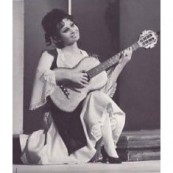| Голос/Инструмент: |
БИОГРАФИЯ
Ursula Reinhardt-Kiss (Soprano)
Born: 1944 (?) - Letmathe/Sauerland, Germany
The German soprano, Ursula Reinhardt-Kiss, studied with Ellen Bosenius in Köln and with Irma Beilke in Berlin.
Ursula Reinhardt-Kiss’ stage debut was at the found at the Landestheater of Saarbrücken in 1967 as Marie in Waffenschmied by Lortzing. She remained in Saarbrücken until 1969 and belonged from 1969 to 1971 to the ensemble of the Stadttheater Aachen. She had then a very successful career as lyric coloratura soprano with appearance engagements at the opera houses of Lübeck, Köln, Zürich and Antwerp. She appeared also as a guest at the Staatsoper and Komischen Oper Berlin, at the Staatsoper Dresden and the Opera House of Leipzig, Milan’s La Scala, the Königlichen Opera Copenhagen, the Opera of Rome, the Opera House of Lüttich (1985 Salomé in Hérodiade by Massenet) and at the Paris Grand Opéra.
At the Staatsoper of Dresden Ursula Reinhardt-Kiss was admired as Aminta in the Schweigsamen Frau by R. Strauss, at the Komischen Oper Berlin as Susanna in Le Nozze di Figaro and the title heroine in Lulu by Alban Berg. In 1977 she worked at the Opera House of Zürich in the premiere of the opera Ein Engel kommt nach Babylon by Rudolf Kelterborn. In 1983 she appeared as a guest at the Schloßtheater of Drottningholm in the opera Il fanatico burlato by Cimarosa. In 1985 she sang in the opening of the Opera House of Graz in the opera Angelica Vincitrice di Alcina by Johann Joseph Fux, in September 1987 at the same house in the premiere of the opera Der Rattenfänger by F. Cerha.
The multi-form stage repertoire of Ursula Reinhardt-Kiss includes roles in operas of Mozart as well as Richard Strauss in the first place, simultaneously to being estimated as an interpreter of modern works. Apart from her affecting stage performances she had just as successful career as concert and in particular as oratorio soprano. Recordings: Philips (sacred music of Mozart), Eterna (Oratorio Lazarus by Schubert; contemporary compositions of Luigi Nono, among other things Epitaph für García Lorca), Pelca (Roi David by Arthur Honegger).






![Complete Mozart Edition - [CD 113] - Kyries KV 322,323. Short Sacred Work](http://static.classicalm.com/repository/composition-cover/small/11287-img1313606858417166.jpg)